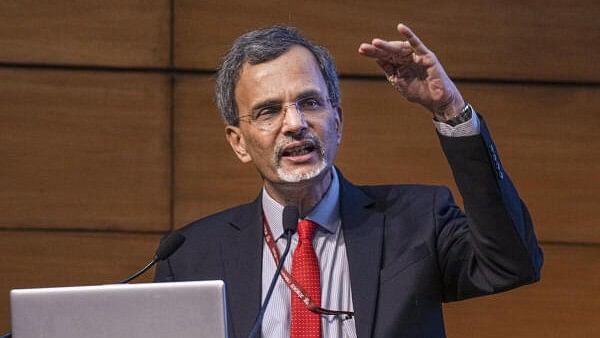
Chief Economic Advisor V Anantha Nageswaran
Credit: PTI Photo
Bengaluru: The Centre’s Chief Economic Advisor V Anantha Nageswaran said on Monday that households are investing more in financial assets, but the market value is not captured in the national income data.
Conversely, the Economic Survey, drafted by Nageswaran and his team, cautioned against significant increase in retail participation in the stock market, especially in futures & options (F&O) trading, and said that expectation of higher returns without real market conditions is a matter of concern.
The Survey said that registered investor base at National Stock Exchange has tripled from March 2020 to March 2024 to 9.2 crore, potentially translating into 20 per cent of the Indian households now channelling savings into financial markets. Demat accounts rose to 1,514 lakh in FY24 from 1,145 lakh in FY23.
Addressing reporters, Nageswaran said that “households are not in distress” and they are investing in financial assets which have done very well.
“Especially in last four years, the foray of retail investors into stock market through SIPs and mutual funds has been quite prolifically documented. Our national income data do not record this at market prices and that is the reason why there is a feeling that financial liabilities have grown faster than financial assets of households,” Nageswaran said.
Asserting that households are doing quite well, Nageswaran said the default statistics of small-ticket loans do not flag any signs of distress in the household sector.
According to official data by the National Statistical Office (NSO), net household savings declined to Rs 14.16 lakh crore in 2022-23, from Rs 17.12 lakh crore in 2021-22, and Rs 23.29 lakh crore in 2020-21.
Over the last few years, the Indian capital markets have seen a surge in retail activity through direct trading in markets through their accounts and indirect trading through mutual fund channels.
“Derivatives trading holds the potential for outsized gains. Thus, it caters to humans’ gambling instincts and can augment income if profitable. These considerations are likely driving active retail participation in derivatives trading,” the Survey said, and asked for for raising investor awareness to warn them of negative expected returns from derivatives trading.
The Survey also called out to the perceived hypocrisy of developed nations as they dictate emission reductions for developing nations, while advancing something as energy-dependent as Artificial Intelligence (AI)
“It would be a comedy if it were not real and tragic,” the survey stated, “that even as developed nations obsess over prospective emissions from the developing world, the widespread adoption of artificial intelligence is going to result in the demand for power to expand to levels not seen in decades in America.”